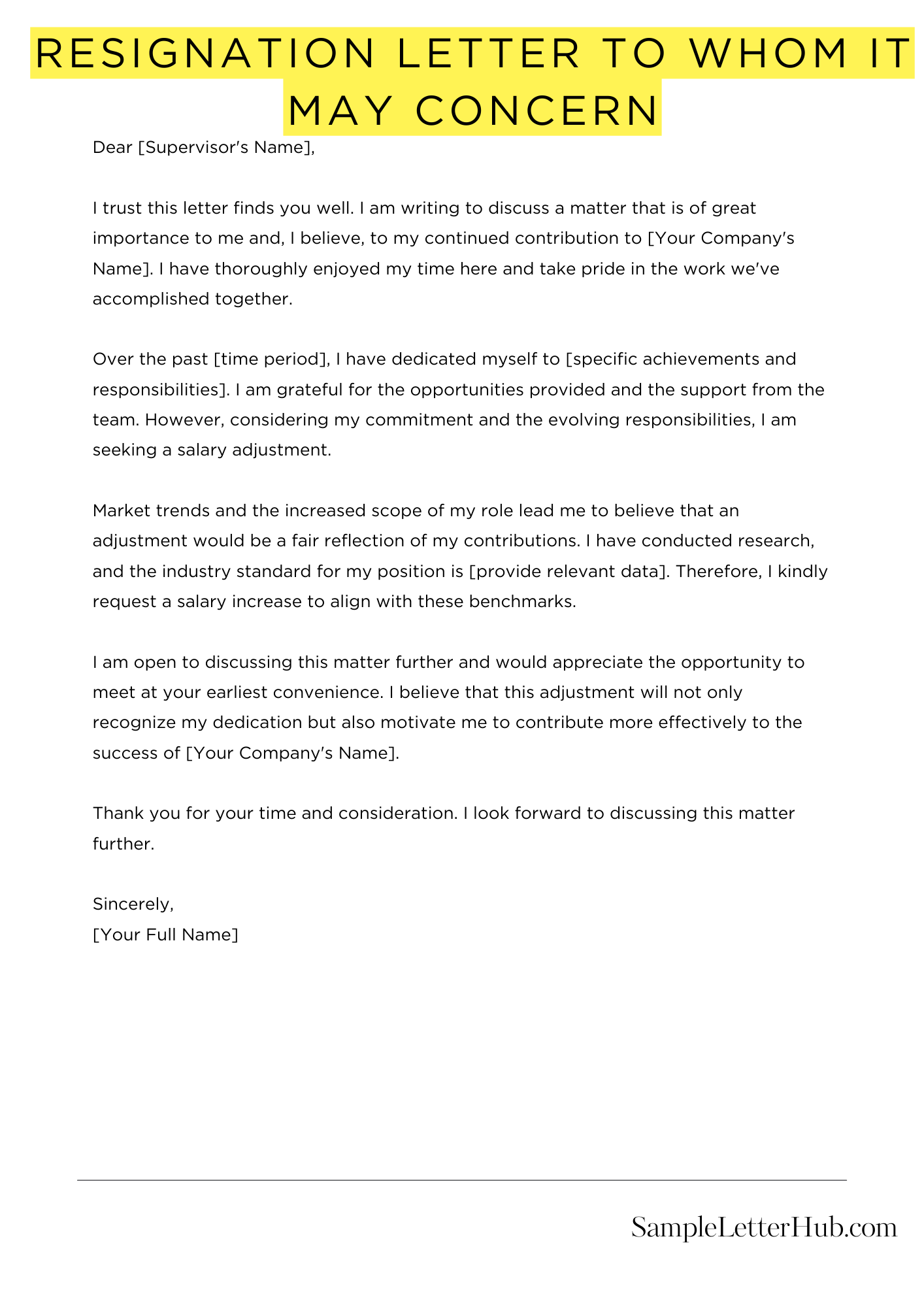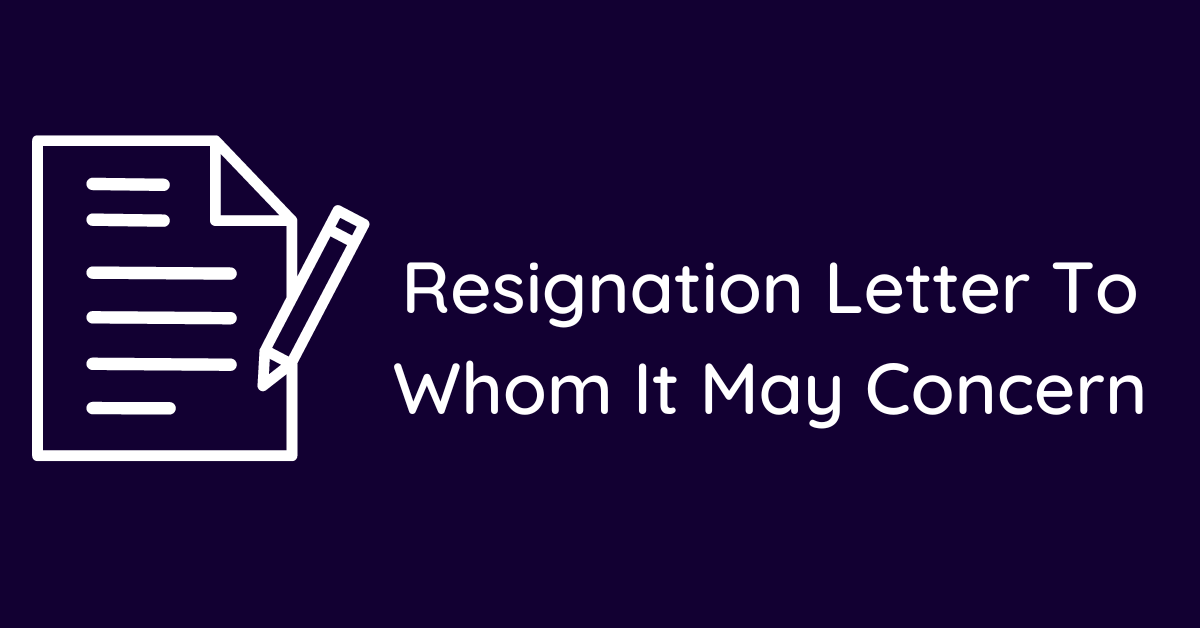Are you planning to resign from your job but don’t know how to write a resignation letter? Look no further! In this article, we will provide you with templates, examples, and samples of a resignation letter to whom it may concern.
A resignation letter to whom it may concern is a formal letter that an employee writes to inform their employer that they are resigning from their position.
The purpose of this letter is to provide a clear and concise statement of the employee’s intention to leave the company and to ensure that the employer has a record of the resignation.
We understand that writing a resignation letter can be a daunting task, especially if you have never done it before. That’s why we have compiled a list of templates and examples to make it easier for you to write your own letter.
Whether you are resigning due to personal reasons, a better job opportunity, or any other reason, we have got you covered. So, let’s get started!
Resignation Letter To Whom It May Concern
I am writing this letter to officially announce my resignation from my position at [Your Company Name]. It is with a mix of gratitude and sadness that I bid farewell to a company that has been an integral part of my professional journey.
After much consideration, I have made the difficult decision to move on to new opportunities. My last working day at [Your Company Name] will be [Last Working Day]. I am committed to completing any pending tasks and ensuring a smooth transition during this period.
I want to express my sincere appreciation for the support and opportunities provided by [Your Company Name]. I have enjoyed working with a team of dedicated professionals and have learned valuable skills that will undoubtedly contribute to my future endeavors.
While I look forward to the next chapter in my career, I will always cherish the experiences and memories gained during my time at [Your Company Name]. I wish the company continued success and growth in the future.
Thank you for the opportunities and support throughout my tenure.
Sincerely,
[Your Full Name]
Two Weeks Notice Letter To Whom It May Concern
I am writing this letter to formally submit my two weeks’ notice of resignation from my position at [Your Company Name]. This decision has not been made lightly, and I want to ensure a smooth transition during this period.
My last working day at [Your Company Name] will be [Last Working Day], providing ample time to wrap up any ongoing projects and assist in the transition process. I am committed to ensuring that all my responsibilities are transitioned smoothly to the team.
I have sincerely enjoyed my time at [Your Company Name] and appreciate the opportunities for professional and personal growth. I am grateful for the support and collaboration from my colleagues and the guidance provided by the management team.
Thank you for the experiences and knowledge gained during my tenure. I look forward to maintaining a positive relationship in the future. Please feel free to contact me at [Your Contact Information] for any necessary discussions during this transition period.
Sincerely,
[Your Full Name]
Resignation Letter Due To Lack Of Training
Dear [Recipient’s Full Name],
I am writing to officially submit my resignation from my position at [Company Name] due to the ongoing issue of insufficient training. After careful consideration and attempts to address this concern, I find it in the best interest of my professional development to step down from my role.
While I have enjoyed working with the team and contributing to the company’s goals, the lack of adequate training has hindered my ability to perform at my full potential. I believe that continuous learning and development are crucial for both personal and organizational success.
During my time at [Company Name], I have appreciated the opportunities and experiences. I value the relationships formed and the knowledge gained from my colleagues. I hope that the company can use this feedback to improve its training processes for the benefit of future employees.
My last working day will be [Last Working Day], providing ample time for the necessary handover and transition. I am committed to ensuring a smooth transfer of my responsibilities and would be happy to assist in training a replacement if the circumstances permit.
Thank you for the opportunities and experiences at [Company Name]. I wish the company continued success in the future.
Sincerely,
[Your Full Name]
Resignation Letter Envelope To Whom It May Concern
Dear [Recipient’s Full Name],
I am writing to formally submit my resignation from my position at [Company Name]. After careful consideration, I believe this decision is in the best interest of my personal and professional growth.
My last working day will be [Last Working Day], providing sufficient time for a smooth transition. I am committed to completing any pending tasks and facilitating the handover process to ensure a seamless transfer of responsibilities.
During my time at [Company Name], I have valued the experiences and opportunities for growth. I appreciate the support and camaraderie of my colleagues, and I am grateful for the knowledge gained.
I wish [Company Name] continued success, and I hope our paths cross again in the future. Please feel free to contact me at [Your Email Address] or [Your Phone Number] if there are any further details required during this transition.
Sincerely,
[Your Full Name]
Resignation Letter With To Whom It May Concern
Dear Sir/Madam,
I am writing to formally submit my resignation from my position at [Company Name]. After careful consideration, I believe this decision is in the best interest of my personal and professional growth.
My last working day will be [Last Working Day], providing sufficient time for a smooth transition. I am committed to completing any pending tasks and facilitating the handover process to ensure a seamless transfer of responsibilities.
During my time at [Company Name], I have valued the experiences and opportunities for growth. I appreciate the support and camaraderie of my colleagues, and I am grateful for the knowledge gained.
I wish [Company Name] continued success, and I hope our paths cross again in the future. Please feel free to contact me at [Your Email Address] or [Your Phone Number] if there are any further details required during this transition.
Sincerely,
[Your Full Name]

How to Write a Resignation Letter to Whom It May Concern
Writing a resignation letter can be a daunting task, especially when you are unsure of how to address it. If you are resigning from your job and need to write a letter to whom it may concern, there are a few things you should keep in mind.
In this article, we will guide you through the process of writing a resignation letter to whom it may concern.
1. Start with a Professional Salutation
When writing a resignation letter to whom it may concern, it is important to start with a professional salutation. Begin your letter with “”Dear Sir/Madam”” or “”To Whom It May Concern.”” This will ensure that your letter is addressed to the appropriate person.
2. State Your Intention Clearly
In the first paragraph of your resignation letter, state your intention clearly. Let the recipient know that you are resigning from your position and the date on which your resignation will be effective. This will help the recipient to understand the purpose of your letter.
3. Provide a Reason for Your Resignation
In the second paragraph of your resignation letter, provide a reason for your resignation. This is not mandatory, but it can help to provide closure and clarity to your employer. Be honest and professional in your explanation.
4. Express Gratitude
In the third paragraph of your resignation letter, express gratitude for the opportunities and experiences you have had while working for the company. This will help to maintain a positive relationship with your employer and colleagues.
5. Offer Assistance
In the fourth paragraph of your resignation letter, offer assistance in the transition process. Let your employer know that you are willing to help in any way possible to ensure a smooth transition for your replacement.
6. Provide Contact Information
In the fifth paragraph of your resignation letter, provide your contact information. This includes your phone number and email address. This will allow your employer to contact you if they have any questions or concerns.
7. End with a Professional Closing
In the final paragraph of your resignation letter, end with a professional closing. Use phrases such as “”Sincerely”” or “”Best regards”” followed by your name. This will provide a formal and respectful ending to your letter.
1. What is a resignation letter to whom it may concern?
A resignation letter to whom it may concern is a formal letter that an employee writes to inform their employer that they are resigning from their position. The letter is addressed to “”whom it may concern”” because the employee may not know who will be reading the letter.
2. When should I write a resignation letter to whom it may concern?
You should write a resignation letter to whom it may concern when you are resigning from your job, and you are not sure who will be reading the letter. This may be the case if you work for a large organization, and you are not sure who your immediate supervisor or HR representative is.
FAQs About Resignation Letter to Whom It May Concern
1. How do I address a resignation letter to whom it may concern?
When addressing a resignation letter to whom it may concern, you should start with a formal salutation such as “”Dear Sir/Madam”” or “”To Whom It May Concern.”” You should then proceed to write the body of the letter, which should include your reason for resigning, your last day of work, and any other relevant information.
2. What should I include in a resignation letter to whom it may concern?
In a resignation letter to whom it may concern, you should include your reason for resigning, your last day of work, and any other relevant information such as your contact information and your willingness to help with the transition.
3. Do I need to give a reason for resigning in a resignation letter to whom it may concern?
While it is not necessary to give a reason for resigning in a resignation letter to whom it may concern, it is generally considered good practice to do so. This can help to provide closure and clarity for both you and your employer.
Related:

